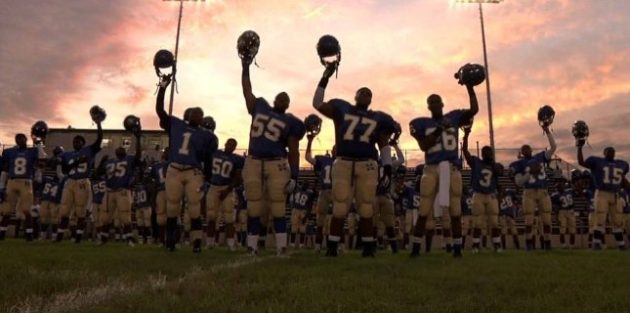REVIEW: Hollywood Heartbeat Powers Stirring Football Doc Undefeated

The underdog candidate for this year's Oscar for Best Documentary Feature, Undefeated is, fittingly, about an underdog sports team, a group of kids from an underfunded urban school for whom football provides some desperately needed structure as well as a possible route to a better life. There's good reason the Weinstein Company reportedly coughed up seven figures for distribution and remake rights to the film -- Undefeated is Friday Night Lights meets The Blind Side in nonfiction form, examining issues of class and race through the lens of its ragtag athletics program while also reinforcing American mythos of bootstrapping, hard work and community. Its triumphs are bittersweet, but they're irresistible.
That title isn't literal, however; there are definite losses over the course of the single hard-fought, promising high school football season this film follows, and it's still one of the best years the North Memphis Manassas Tigers have ever had. Bill Courtney is Undefeated's center, a ruddy-faced, sweaty white guy who serves as volunteer coach at the mostly (if not entirely) black school. We first see him lecturing his team about how their ranks have been decimated by drop-outs, shootings and arrests: "Most coaches, that would be a career's worth of crap to deal with. That sums up the last two weeks for me." Bill has a family of his own and a flooring company to run, but coaching is his great love, and the depth of his investment in it and his sincere faith in the potential saving power of football make his gruff character easy to latch on to. He looks to be the closest thing most of the young men he works with have to a male authority figure in their lives, fathers out of the picture, and they latch on to his devotion and to the expectations he has of them with a quiet hunger.
Undefeated also follows three of Courtney's players through the year. The talented, good-natured O.C. Brown stands a good chance of getting a football scholarship if he can pulls his grades up. Montrail Brown, who goes by "Money," is a good student working towards college until an injury on the field derails him and destroys his confidence. And Chavis Daniels arrives back on the team after a stint in juvie, and has alarming rage issues to manage.
The Tigers have never won a playoff game, and they're so underfunded that they used to raise money by traveling to play other schools for pay as an easy win. Over their season they face teams that are obviously more upscale (and ones whose racial make-up is very different) as well as teams that aren't -- one game against another Memphis school ends with the police on field shooing the boys back onto their bus to head off a potential brawl with the opposing school. Despite some early setbacks, the Tigers are having a good year, and as the team wends its way to a possible playoff spot the film starts to shine as it delves into the personal lives of its players. O.C. is going to become unrecruitable if his academics don't improve, but tutors won't go to the neighborhood where he lives with his grandmother, so another (white) coach takes him in a few days a week, O.C. moving into the coach's comfy suburban set-up with his wife and kids. The matter-of-factness with which this and a later act of startling generosity are done make them heartwrenching, but also provide a reminder of how difficult things like paying for college or getting better at classwork can be without outside help.
Money struggles to find motivation to keep going with school after a knee injury possibly ends his season, and flirts with dropping out. Chavis, the most haunting character, seems to have no filter on his emotions, rage seething up without warning and dissipating just as quickly. He chooses the number "0" for himself because he claims he has no sense, and has a clash with another player based on nothing at all. But he keeps coming back, gets off suspension, finds a place for himself on the team, realizing he needs football and has to change if he wants to be allowed to stay with it. "I'll die for you tonight," he tells Bill when he's put in the game, and you believe him.
Aside from what looked like a few technical snags in terms of color, Undefeated's look is fluid and vital. It's shot vérité style, but still finds moments for nods to studio magic -- a circling camera around a hugging Bill and O.C. toward the end is unadulterated, completely effective Hollywood. Directed and edited by Daniel Lindsay and T.J. Martin (the pair collaborated previously on 2008's Last Cup: Road to the World Series of Beer Pong), the film finds romance in its images of the sport, from the boys walking off the field at sunset to the battles under the bright lights to a close-up that lingers on the Manassas temporary tattoo one player has fixed to his cheek. Undefeated doesn't have the epic, years-spanning arc of Hoop Dreams, but it finds in its season some unfeigned resonance that, like tears during that final embrace on the field, can't be eluded.
Follow Alison Willmore on Twitter.
Follow Movieline on Twitter.
